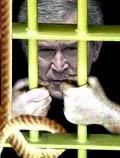| Find |
Tuesday, 6 November 2007
U.S. Plan Envisioned Nuking Iran, Syria, Libya
 Despite years of denials, a secret planning document issued by the U.S. military's nuclear-weapons command in 2003 ordered preparations for nuclear strikes on countries seeking to acquire weapons of mass destruction, including Iran, Saddam Hussein-era Iraq, Libya and Syria.
Despite years of denials, a secret planning document issued by the U.S. military's nuclear-weapons command in 2003 ordered preparations for nuclear strikes on countries seeking to acquire weapons of mass destruction, including Iran, Saddam Hussein-era Iraq, Libya and Syria.
A briefing (pdf) on the document obtained by the Federation of American Scientists, showed that the document itself was created to flesh out a 2001 Bush administration revision of long-standing nuclear-weapons policy, known as the Nuclear Posture Review. That review was a Defense Department-led attempt to wean nuclear policy off a Cold-War focus on Russia and China, but the shift raised questions about what purpose nuclear forces would serve apart from deterring an attack. In March 2002, leaks indicated that the review would recommend preparations for nuclear attacks against WMD-aspirant states. Arms Control Today pointed out at the time that planning to attack non-nuclear states that were signatories to the nuclear Non-Proliferation Treaty reversed decades of U.S. nuclear policy.
The administration's response was to deny that the review moved the U.S. from deterrence to a first-strike posture. After the leaks, the Defense Department issued a statement in March 2002 saying cryptically, "This administration is fashioning a more diverse set of options for deterring the threat of WMD. ... A combination of offensive and defensive, and nuclear and non-nuclear capabilities is essential to meet the deterrence requirements of the 21st century." Speaking to CNN around the same time, General Richard Myers, then the chairman of the Joint Chiefs of Staff, said the Nuclear Posture Review was "not a plan, it's not an operational plan. It's a policy document. And it simply states our deterrence posture, of which nuclear weapons are a part." Vice President Dick Cheney said at the time that the notion that the review paved the way for "preemptive nuclear strikes" was "a bit over the top." More...
Posted at
17:19
![]()
Post Title: Libya, Syria, U.S. Plan Envisioned Nuking Iran
![[Zionazis-1.jpg]](https://blogger.googleusercontent.com/img/b/R29vZ2xl/AVvXsEg_x8DOGucgHQmfJJujuK_oYJdxhEnskhQqt-Og7lSk52HeaDQYzW8NQWfdpHmPgj_FJN0jJ3tz1prR1jVZHdHky2HDQxxcs4LVxX0DtAt3fG0sfRr6MDx7Sz8cJNjl0k0RS9TbCjangQ/s1600/Zionazis-1.jpg)




